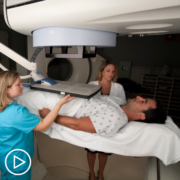An Expert’s Review of Advanced Prostate Cancer Treatment and Research
An Expert’s Review of Advanced Prostate Cancer Treatment and Research from Patient Empowerment Network on Vimeo.
What’s the latest in advanced prostate cancer treatment and research? Expert Dr. Tomasz Beer shares recent updates, and discusses how developing therapies could impact the future of prostate cancer care.
Dr. Tomasz Beer is Deputy Director at OHSU Knight Cancer Institute. Learn more here: https://www.ohsu.edu/people/tomasz-m-beer-md-facp.
See More From Engage Prostate Cancer
Related Resources
Transcript:
Katherine:
When it comes to prostate cancer research and emerging treatment options, what are you excited about specifically?
Dr. Beer:
Well, there is so much to talk about there. And I do want to say that the things that we’re excited about and that are promising, we want to present them in the proper light, meaning that they’re significant potential advances, but they’re not necessarily cures next year.
You know, we want to raise hopes and excitement at a proper level. So, I think right now, what we’re seeing is progress that is likely to yield drugs that will extend survival, will help us control the disease in a meaningful way. We’re not yet at a point where we can, for advanced prostate cancer, have a reasonable hope of cure in the near term. That doesn’t mean we’re not trying. We’re aiming high, absolutely.
But at the moment, the most exciting thing right in front of us, in my view, is lutetium 177-PSMA 617. That is a radioactive molecule attached to a binder that is specific to prostate-specific membrane antigen, PSMA, and essentially delivers this radioactive drug directly to prostate cancer cells by attaching to that target, the PSMA.
We recently completed and reported at ASCO and published in the New England Journal of Medicine the results of a Phase III trial, where we were able to show extension of life, extension of control of cancer, in a meaningful way, with this drug, and we’re eager to see the FDA’s review, and I think generally hopeful that the FDA will allow this drug on the market hopefully in the coming months. So, that’s a real tangible thing that is not just pie in the sky years away. I think it’s likely to be available sometime in less than a year, hopefully much less than a year. Speculating on those things is always a little risky, but –
Katherine:
Of course.
Dr. Beer:
– we all think that’s coming.
I think there are several other targeted drugs that may expand the portfolio of things that we can do in response to a mutational analysis. So, I mentioned microsatellite instability and DNA repair defects. There might be treatments for mutations in a pathway called AKT and others. And so, I think we’re going to see more very specific drugs that address segments of prostate cancer. And then a big area of activity that I’m very excited about is immunotherapy. And immunotherapy has been difficult in prostate cancer.
It has made more headway in melanoma and kidney cancer, and a number of other solid tumors, frankly, and we’re a little bit behind, and I think in part because natural prostate cancer doesn’t elicit quite as much of an immune response as some of the other tumor types; so, it’s not so easy.
But some of the newest technologies for synthetic antibodies are being designed that link the T cells from the immune system directly to prostate cancer cells and activate them, I think hold a lot of promise.
And ultimately, when it comes to cure, the immune system right now looks like the most promising strategy for actually eradicating cancer because once you activate the immune system, it can really do quite a job on cancer. Right now, for prostate cancer, that is still almost entirely in clinical trials and still for a minority of patients. So, this is not an answer for everybody, but once we get a hold of something that’s promising, I think the field’s going to work very hard to expand its utility and make it a reality for more and more patients.













